Text
my friend and i were going to study a language together and wound up having to cancel our plans due to scheduling pressures, but! through research we came across a really cool resource for reading in a TON of languages: bloom library!
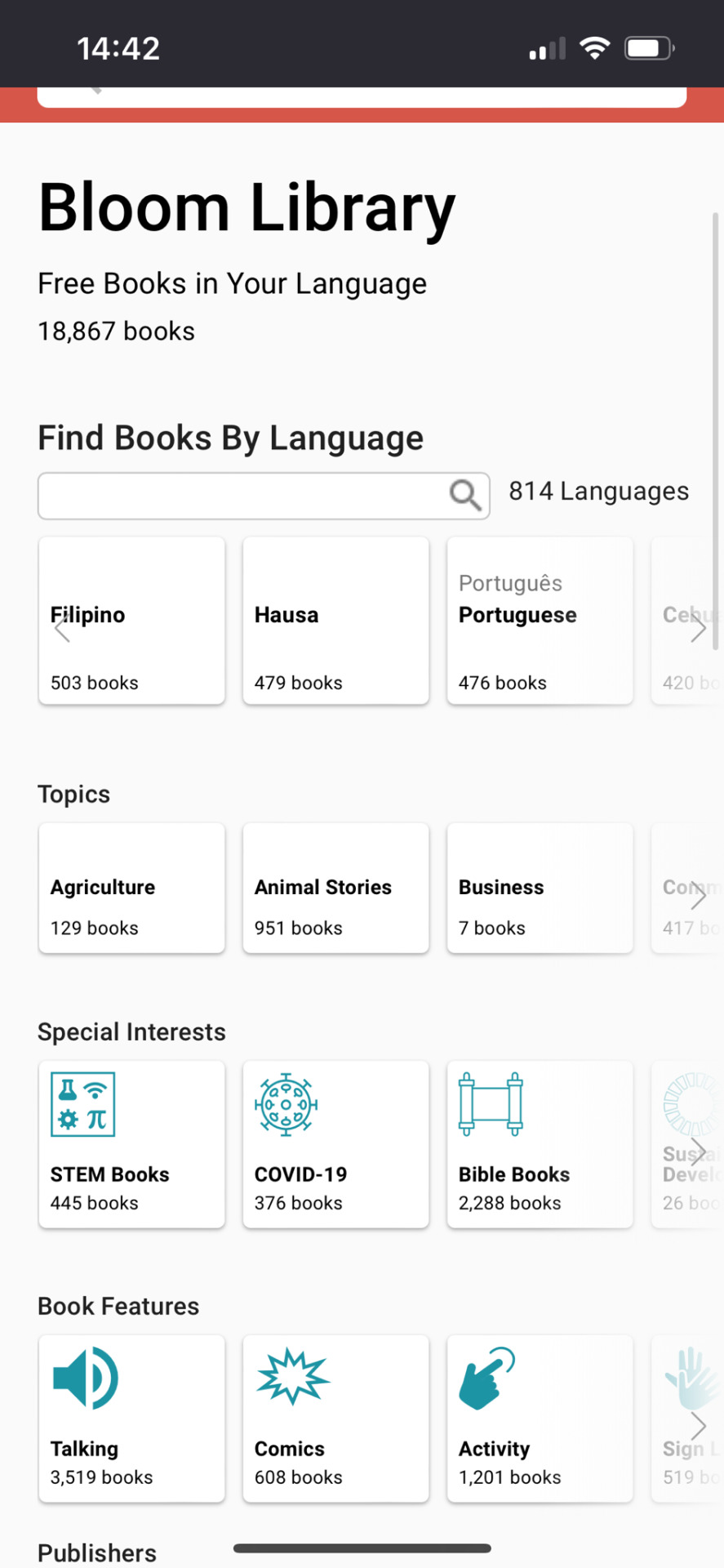
as you can see, it has a lot of books for languages that are usually a bit harder to find materials for—we were going to use it for kyrgyz, for example, which has over 1000 books, which was really hard to find textbook materials for otherwise. as you can see it also has books with audio options, which would be really useful for pronunciation checking. as far as i can tell, everything on the site is free as well.
1K notes
·
View notes
Text

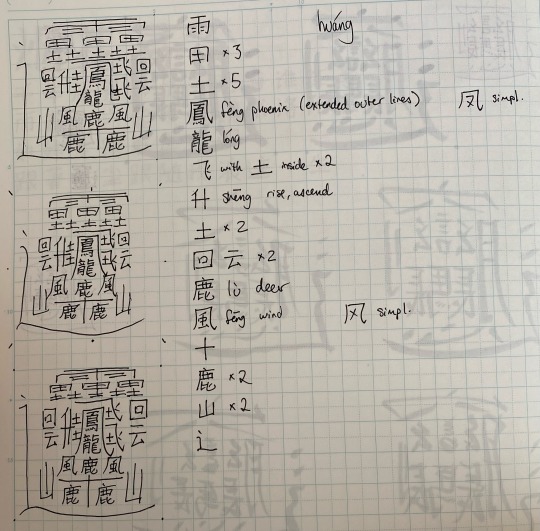
Super long character practice: biáng and huáng
The first is often considered the character with the most strokes and refers to a type of noodle (biangbiang mian).
The second has more strokes but isn’t really a word. It’s considered an artistic representation of heaven, in character form.
I feel like biáng was actually possible to get somewhat decent, but huáng was just incredibly difficult to get the spacing right 😂
55 notes
·
View notes
Text
音系学,音位学 - Phonology
音位学分析 yīnwèixué fēnxī - phonological analysis
音系表征 yīnxì biǎozhēng - phonological representation
心里表征 xīnlǐ biǎozhēng - mental representation
抽象表征 chōuxiàng biǎozhēng - abstract representation
单位 dānwèi - units
音段 yīnduàn - segment
音节 yīnjié - syllable
音节首 yīnjiéshǒu - onset
音节核 yīnjiéhé - nucleus
音节尾 yīnjiéwěi - coda
音拍 yīnpāi, 莫拉 mòlā - mora
音步 yīnbù - foot
莫拉理论 mòlā lǐlùn - moraic theory
音节长度 - syllable length
音位 yīnwèi - phoneme
最小对立体 zuìxiǎo duìlì tǐ - minimal pair
区别意义 qūbié yìyì - distinguish meaning
对立的 duìlì de - contrastive
边缘对立 biānyuán duìlì - marginal contrast
音位中和 yīnwèi zhōnghé - phonemic neutralization
音位变体 yīnwèi biàntǐ - allophone
环境 huánjìng - environment
条件变体 tiáojiàn biàntǐ - conditioned variant
自由变体 zìyóu biàntǐ - free variation (无条件变体)
预测 yùcè - predict
互补分布 hùbǔ fēnbù - complementary distribution
自然类 zìrán lèi - natural class
在一定条件下产生 "produced under certain conditions" (产生 chǎnshēng "give rise to, produce")
在其他实词中都呈现互补分布。"They all present complementary distributions in other content words."
如果有一群语音共享一个或多个发音或听觉特征,而且同一个语言的其他音没有,这群语音就组成一个自然类。"If a group of sounds shares one or more articulatory or auditory features, which are not shared by the other sounds of that language, then that group of sounds is a natural class."
音位配列 yīnwèi pèiliè, 语音组合法 yǔyīn zǔhé fǎ - phonotactics
规则 guīzé - rule
替换 tìhuàn - substitute, replace
语音同化 yǔyīn tónghuà - assimilation
语音异化 yŭyīn yìhuà - dissimilation
语音省略 yǔyīn shěnglüè - deletion, elision
插音 chāyīn - epenthesis, insertion
语音变换 yǔyīn biànhuàn - metathesis
补偿延长 bǔcháng yáncháng - compensatory lengthening
连音 liányīn- sandhi, liaison
变调 biàndiào - tone sandhi
底层表达 dǐcéng biǎodá - underlying representation (底层形式 dǐcéng xíngshì, 底层表现 dǐcéng biǎoxiàn)
表层表现 biǎocéng biǎoxiàn - surface form
自主音段音系学 zìzhǔ yīnduàn yīnxìxué - autosegmental phonology
特征 tèzhēng - feature
音层 yīncéng - tier, level (as used in phonological context)
自主音段音系学理论把不同的区别性特征放在不同的音层上。
超音段 chāoyīnduàn - suprasegmentals
韵律 yùnlǜ - prosody
语调 yǔdiào - intonation
音高 yīngāo - pitch
响度 xiǎngdù - loudness
重音 zhòngyīn - stress, accent
节奏 jiézòu - rhythm, timing
重音节奏 zhòngyīn jiézòu - stress-timed
音节节奏 yīnjié jiézòu - syllable-timed
音拍节奏 yīnpāi jiézòu - mora-timed
表征的模型 biǎozhēng de móxíng - representation models
样本理论 yàngběn lǐlùn - exemplar theory
自下而上的过程 zìxià'érshàng de guòchéng - bottom-up process
自上而下的过程 zìshàngérxià de guòchéng - top-down process
优选论 yōuxuǎn lùn - Optimality Theory
制约排列 zhìyuē páiliè - constraint ranking
忠实性制约 zhōngshí xìng zhìyuē - faithfulness constraint
标志性制约 biāozhì xìng zhìyuē - markedness constraint
候选项目 hòuxuǎn xiàngmù - candidate
其他啊啊啊 (other)
范畴性的 fànchóu xìng de - categorical
阶层性的 jiēcéng xìng de - gradient
感知 gǎnzhī - perceive
发音 fāyīn - produce (sound), pronounce, enunciate
#中文#汉语#mandarin#mandarin studyblr#langblr#chinese langblr#词汇#chinese vocab#mandarin vocab#vocab#I’ve been sitting on this post for like a year now cuz I couldn’t find translations of a few more terms I wanted#alas#idk I just wanted to post it finally and probably make another one for vocab abt syntax lol#since apparently that’s what my thesis is#and I’ve been talking a lot w a classmate who’s doing hers on Chinese syntax#fun stuff#linguistics#语言学
34 notes
·
View notes
Text
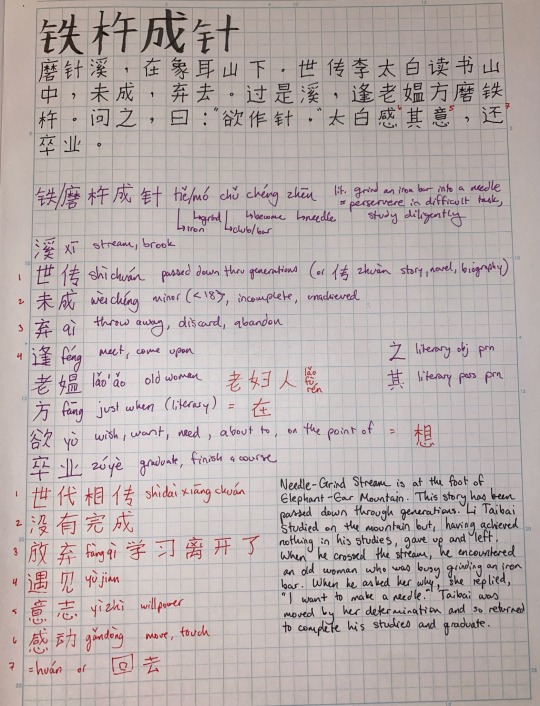
铁杵成针 tiě chǔ chéng zhēn - grinding an iron rod into a needle
This chengyu comes from a story about a student who has quit school and given up. However, on seeing an old woman working to grind an iron rod all the way down to a needle, the student is inspired by her perseverance and decides to return and graduate. Even though grinding an iron rod into something so thin as a needle will take her hours and hours of work, the woman does not give up.
The story’s original text is above in black, terms I was unfamiliar with are in purple, and some notes on modern vocabulary equivalents are in red.
31 notes
·
View notes
Text
39K notes
·
View notes
Text
的 as an attitude marker
I was talking with a classmate who’s doing her master’s thesis on temporal marking in Mandarin (“tense”, aspect, etc.) and she mentioned this interesting distinction that using 的 makes in sentences like:
我会去美国。
我会去美国的。
Both sentences refer to the future (会), but the second sentence adds the speaker’s certainty on the matter. They know they’re going to travel, it’s certain to happen (at least in their opinion).
It feels similar to the 是…的 construction, which emphasizes the material preceding the 的. But in both cases, it seems like the final particle is serving the same underlying purpose of emphasizing, showing speaker certainty about the matter.
For example, if I say 他是在中国学习的汉语,I’m certain that he studied in China, and I’m highlighting that information as the focus of the sentence.
45 notes
·
View notes
Text
整天瞎逼忙,还TM不挣钱
zhěngtiān 整天 - all day
xiāmáng 瞎忙 - be busy
zhèngqián 挣钱 - make money
And of course the swears 逼 bī and TM 他妈 tāmā

20K notes
·
View notes
Text
How the guibu (鬼步;"ghost step") in Chinese opera is achieved
English added by me :)
2K notes
·
View notes
Text
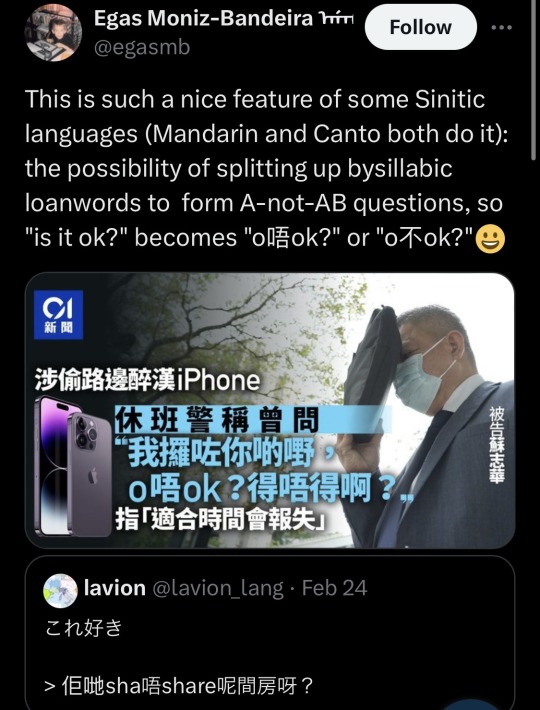
I saw this on Twitter and then asked some Chinese friends about it because I thought it was super cool. Because yeah, apparently two-syllable (or two-part? Like below with “share”) loanwords can be reanalyzed as separable morphemes.
One friend also said it sounded outdated lol like from when she was little, maybe 15 years ago or so. But still!
34 notes
·
View notes
Text
a very incomplete list of cdramas (plus a few chinese films) i've watched and my rating for hsk proficiencies for them below the cut!
i've watched some shows that aren't included on this list, but i didn't watch enough of them to get a good sense for the level of challenge they pose, so they're omitted from the list. i've also included links to the mydramalist pages, if you want to get a sense of the plot.
i had to remove the list format, since tumblr decided i had too many characters per block of text, so i apologise for that. a number of these can be watched on youtube with english fansubs, but if you can't find something, you can always dm me and i'll get you a link!
沙海/tomb of the sea: this fits into the extended daomu biji/grave robbers' chronicles/lost tomb franchise, but you don't have to have seen the other shows or read the books to watch it, and the pov character is an outsider who also doesn't understand what's going on 90% of the time. this show is contemporary, and you could probably start watching it at a fairly low hsk level because it doesn't have a ton of complicated technical or genre-specific terms. the subbing in english decent, since it came out a while ago, but there are some errors that crop up with names and nicknames. if you wanted to watch it without subtitles, i'd say you could probably get the gist of what's being said at around an hsk 4 or hsk 5 level. it has 52 episodes, each around 45 minutes long. (mdl link)
双镜/couple of mirrors: set in the republican era, so some of the terms used are a bit outdated in terms of colloquialism, and it also has a mystery/detective element to it, so that could pose a bit of a struggle. that said, the show isn't actually too challenging in terms of vocab—i would say you could watch it without english subtitles at an hsk 3 level with some struggle, and with a fair amount of ease at hsk 4. 12 episodes, at 46 minutes each. (mdl link)
云泽传/legend of yunze: wuxia/xianxia, which makes the amount of unfamiliar terms higher if you aren't used to the genre, but the episodes are all very short, and the plot itself isn't overly complicated, which makes it easy to sit down and watch in one go. on a level of difficulty, as long as you're familiar with wuxia/xianxia terms, you could probably watch this at an hsk 2 level without too much issue, and the subbing in english is very thorough. has multiple seasons, but the first season is 12 episodes, between 3-7 minutes each. (mdl link)
神探/detective l: this is a procedural detective show, and it's set in the 1930s republican shanghai, so there's a combination of more formal/outdated language and specialised detective/case-related phrases. the english subs are decent, though, and the actors all enunciate clearly, which helps if you need to look up words. i would say this would probably be a bit of a struggle below the hsk 5 level, but you'll pick up a lot of new, crime-related phrases. 24 episodes, 40 minutes each. (mdl link)
不良执念清除师/oh no! here comes trouble!: i'll be honest, this one was a struggle for me because of the taiwanese accent. i can understand what they're saying, it just sounds like the auditory equivalent of someone coming into my house and moving everything a few centimetres to the left. this is also a procedural show, but contemporary, so not quite as challenging in terms of vocab to detective l, in my opinion..........but it's also got a heavy supernatural element, which does come with specific vocab. the subbing is good, but if you're going to watch it, this one probably requires a higher hsk level to keep up—hsk 5, at a minimum, in my opinion. 12 episodes, 52 minutes each. (mdl link)
s.c.i谜案集/sci mystery/sci: another contemporary procedural mystery show, but from the mainland, so there's no elements of supernatural. surprisingly simple vocabulary; you could watch this at an hsk 2 level and get the gist, and an hsk 3 or hsk 4 level would let you watch it just fine. has fairly good english subs, and i believe they set the show in hk, which accounts for the higher than usual amount of english usage, up to and including in dialogue. the only bit that might make it challenging is the heavy lean into the psychology, but it's all largely explained directly, since most of the characters aren't familiar with the terms either. 24 episodes, 45 minutes each. (mdl link)
成化十四年/sleuth of the ming dynasty: ming dynasty (mid 1400s, under the chenghua emperor) setting, but a fairly colloquial vocabulary. there are some specialised titles used, but those are fairly self-evident by the way the show is shot, and easy enough to look up. the english subs are good, and i would put this at an hsk 4 level—but even at an hsk 3 level you probably won't struggle too badly. my hangup here was, again, one of the leads being played by an actor with a taiwanese accent, though it's not too heavy. 48 episodes, 45 minutes each. (mdl link)
老九门/the mystic nine: dmbj prequel, set in the tail end of the republican era (1939, if i remember correctly?). has a lot of tomb- and tomb-robbing specific vocabulary, alongside the more dated modes of speech, so i would put this up at an hsk 5 or hsk 6 level, but there's decent subs, so you could watch it at lower levels, it would just be a bit of a challenge. 48 episodes, 42 minutes each. (mdl link)
猎罪图鉴/under the skin: contemporary procedural show; there's a lot of emotion- and motive-specific words used, and the fact that it's a procedural makes it a bit more challenging, in my opinion. i would recommend that don't start with this show, just because of the fact that it's pretty easy to get lost if you don't grasp some of the vocabulary. i'd put it at an hsk 6 level, but that said, the subs are good and you can watch it at an hsk 5 level with some effort, i think. 20 episodes, 45 minutes each. (mdl link)
春风沉醉的夜晚/spring fever: honestly not as challenging in terms of vocabulary as a lot of things on this list, and fairly contemporary (set in the 2000s). i would say if you're at an hsk 4 level, you will probably do alright with it. 116 minutes in total. (mdl link)
关于我和鬼变成家人的那件事/marry my dead body: another case of struggling to acclimate to the taiwanese accent; otherwise, not too complicated in terms of vocab, though there are some spirit/marriage-specific terms used. overall, though, i'd put this at an hsk 4 level as well. 130 minutes in total. (mdl link)
陈情令/the untamed: heavy on the wuxia/xianxia elements, so unless you're familiar with that, you might struggle a lot to get through it. this is a lot of peoples' entry into cdramas, though, so it's not utterly inaccessible, and has decent english subs. i would put this around an hsk 5, if you want to watch it without subs, though you'll probably still have to pause and look up some words here and there even then. 50 episodes, 45 minutes each, making it the longest on this list. (mdl link)
山河令/word of honour: arguably the hardest on this list, i would say, because it's so plot-heavy. i, as a native speaker, struggle to follow along with this for extended amounts of time because there's a combination of 1. a lot happening, 2. a lot of wuxia terms, and 3. a lot of references to literature/art/etc. i would put this up at an hsk 7 level, honestly. that said, the subs for this are very good. 36 official episodes with a 37th mini-episode, 45 minutes each for the regular ones. (mdl link)
天官赐福/heaven official's blessing: one of the easier shows on this list; i would put this at an hsk 3 or hsk 4 level; there's some words you probably won't know, but while it does fall under xianxia, it doesn't go into that as much in terms of vocabulary as cql/the untamed does. i believe both seasons have both official subbing and official dubbing into english available, but that's not how i watched it, and i've only seen the first season, which is 11 episodes and about 20 minutes per episode. (mal link)
致命游戏/the spirealm: not particularly challenging in terms of actual vocab, but as of yet, only the first few episodes are subbed, since it came out literally this month, and the other subs are all auto-generated and.............very lacking. that said, it's a contemporary setting, and i would put this at an hsk 5 level, give or take; there are some references to folklore, but the characters research and explain or deduce the explanations of what is happening as it occurs, and you aren't left to struggle to figure it out yourself. 78 episodes, but each one is a bit under 20 minutes long, so it actually isn't that much content in total. (mdl link)
82 notes
·
View notes
Text
The directional "下/上/出/去/来" puzzle guide
I for one still confuse the usage of 出来 and 出去 and other similar structures so here's a guide to slightly depuzzle this puzzle.
上去 (Shàngqù): To go up and away from the speaker
下去 (Xiàqù): To go down and away from the speaker
出去 (Chūqù): To go out and away from the speaker
出来 (Chūlái): To go out and towards the speaker
上来 (Shànglái): To go up and towards the speaker
下来 (Xiàlái): To go down and towards the speaker
过来 (Guòlái): To ask someone to come over to the speaker
过去 (Guòqù): This one is tricky as it can have a few meanings so here are some random examples.
Movement away from the speaker e.g. 我来这家公司工作已经过去五年了= I have been working in this company for the past five years
Movement in time during the past e.g. 过去的年份里,公园里有很多树和花= In the past years, there were many trees and flowers in the park
Here's an illustration I made (it's been a while lol) to make it less (?) confusing:

180 notes
·
View notes
Text
新年词汇
大家好,新年快乐!
I've been seeing New Year's posts and sayings all over social media lately, so I just wanted to make a post collecting some of the phrases I've seen.
恭喜发财 gōng xǐ fā cái - may you have a prosperous New Year (财 indicating wealth and fortune)
恭贺新春/禧 gōng hè xīn chūn/xǐ - Happy New Year
龙年大吉 lóng nián dà jí - (wishing you) great luck (大吉) in the year of the dragon
身体健康 shēn tǐ jiàn kāng - (wishing you) health
万事兴隆/龙 wàn shì xīng lóng - may everything (万事) be prosperous (兴隆), with the pun that 隆 and 龙🐲 are homophones
龙/荣华富贵 lóng/róng huá fù guì - (wishing you) glory (荣华) and wealth (富贵), again playing with the similarities between 龙🐲 and 荣
龙凤呈祥 lóng chèng chéng xiáng - the dragon and the phoenix will bring luck
梦想成真 mèng xiǎng chéng zhēn - (may your) dreams come true
龙行龘龘 lóng xíng dá dá - (may you) fly like a dragon (i.e., upwards and full of energy)
3x 龍(龙) indicates the appearance of the flight of a dragon
生活䲜䲜 shēng huó yè yè - (may your) life be full of fish
4x 魚 (鱼) indicates abundance, prosperity
前程朤朤 qián chéng lǎng lǎng - (may) the road ahead be shining and splendid
4x 月 indicates brightness, shining
(for more discussion on the unique characters in these last three, see this post on Zhihu)
Hope everyone has a great Spring Festival and a Happy New Year!
春节快乐!
#中文#汉语#mandarin#mandarin studyblr#langblr#chinese new year#spring festival#lunar new year#year of the dragon#龙年#新年快乐#词汇#mandarin vocab
45 notes
·
View notes
Note
do you have any idea when people in china stopped bowing to each other as a greeting? it seems like the most common forms of greeting now is to shake hands or wave both which were introduced from the west. it's the same in taiwan too.
Tldr: It never stopped because Chinese people never had the practice of bowing in greeting the way that Japanese people did/do.
-
(Note: there are types of greetings that involve a sort of bowing (ketou), but this is reserved for special occasions)
Back in the day there was greetings were made by clasping one's hands in front of them in the direction of the person being greeted. There might be some head lowering/slight bowing involved but it's done in conjunction with the hand greeting. You can see various forms of this in historical dramas and even hanfu shows and shortform videos. The exact way one held their hands changed in some years but the general idea is the same.
Women's and men's hand greetings differed back in the day. A women's greeting was called 万福礼 wànfùlǐ and consisted of holding the hands in front of oneself and bending the legs, or holding hands at the hip, etc. The exact way to hold the hands also changes through the years. Women also do what is called 肃拜 sù bài, which is an earlier form of a women's greeting and includes getting on one's knees (thus the 拜).
Some examples of greetings:
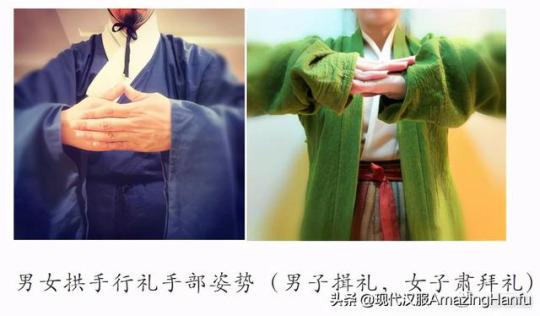
Men's vs women's hand positions



拱手礼 gōngshǒu lǐ ("cupped hands greeting"). The most common greeting. Top photo shows the gendered difference for proper etiquette for nowadays if you ware going to do it, for example, as a new year's greeting.
Bottom photos: I think if you look carefully in modern society, you can still see examples of this greeting in China. It is a gesture that can also be used to expresses one's gratitude. It is still there, it's just fell out of vogue in favor for waving and hand shaking.
This can also be seen in The video above shows Ming era 万福礼 as well as men's 揖礼. 作揖礼 zuòyī lǐ ("bow with clasped hand greeting") is kind of the same thing as 拱手礼, but 作揖 specifically includes a slight bow whereas 拱手礼 is merely the raising of the hands.
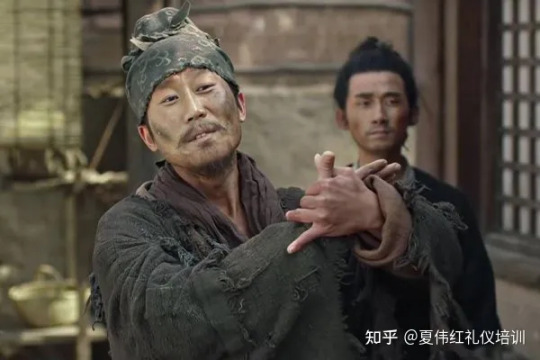
叉手礼 chāshǒu lǐ ("crossed hands greeting") popularised during the Western Jin - Song dynasties, seen in the drama "The Longest Day in Chang'an", which takes place in the Tang Dynasty. This particular greeting started out as one used by Buddhists in the Eastern Han dynasty.
https://zhuanlan.zhihu.com/p/489897518

抱拳礼 bàoquán lǐ ("cupped fist greeting"). This one is something done more so by martial artists. For men, you use your left hand to cover your right hand. For women, the opposite is true. It is also called 吉拜 jíbài when showing respect. If you flip your hand (keep in mind men/women do this the opposite way), it is called 凶拜 xiōngbài and it used to show respect to the dead. So one has to pay attention to this.
There's kind of a lot more etiquette rules you could get into but this answer has already sort of gone beyond the scope of your question lol. Chinese people wrote rites books over the many dynasties so actually there are descriptions of how these greetings were done and over time and that's how they are replicated in dramas and movies.
1K notes
·
View notes
Text
【南斋宴笔录:双生】 单词 1
I'm reading a 漫画! My friend recommended this 3 chapter short story (which is part of 南斋宴笔录) called 双生 Twins. In chapter 1, I had a total of 56 new content words (nouns & verbs) as well as a few sound effects, particles and idioms. Here are the ones I find most interesting and functional~~
单词:
衣冠冢 / yī guān zhǒng / cenotaph; tomb containing clothing and personal effects of a person when the body is missing/elsewhere
药房 / yào fáng / pharmacy, drugstore
媒婆 / méi pó / matchmaker
祖先 / zǔ xiān / ancestors
拼命 / pīn mìng / to do one's utmost, with all one's might; at all costs; as if one's life depends on it
嫁 / jià / to marry, to marry off (a daughter)
加倍 / jiā bèi / doubly, redouble
笔迹 / bǐ jì / handwriting
临终 / lín zhōng / approaching one's end; on one's deathbed
念书 / niàn shū / to study, to attend school, to read
抢走 / qiǎng zǒu / to snatch (re: robbery)
后悔 / hòu huǐ / to regret, repent
吆喝 / yāo he / to shout, bawl, yell
求 / qiú / to beg, request (used as 求求 in this chapter twice)
拜托 / bài tuō / to request or beg (someone to do something)
永远 / yǒng yuǎn / always, forever, eternal
玉佩 / yù pèi / jade pendant
归宿 / guī sù / a place to return to; permanent home
胡说 / hú shuō / to talk nonsense; drivel
罢了 / bà le / that's all, nothing else (modal particle)
成语:
有缘无分 / yǒu yuán wú fèn / destined to meet, but not fated to be together
李代桃僵 / lǐ dài táo jiāng / to substitute one thing/person for another (lit: the plum tree withers in place of the peach tree)
49 notes
·
View notes